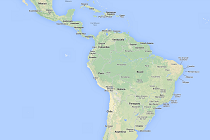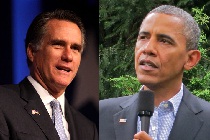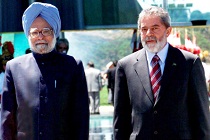Latin America Update, September 2013
In 'Latin America Update' Gateway House lists some of the important events in Latin America over the past month
 Courtesy:
Courtesy:
In 'Latin America Update' Gateway House lists some of the important events in Latin America over the past month
 Courtesy: Ed Gaillard/Flickr
Courtesy: Ed Gaillard/Flickr
Following the 2008 mortgage crash, the U.S. Federal Reserve Board implemented a quantitative easing policy – to stabilise the banks, and rejuvenate the economic environment. Although this strategy has brought some respite, it has done so without creating many new jobs for Americans.
The establishment of a BRICS Development Bank will be among the prime topics of discussion at the BRICS Summit on March 26. Gateway House’s Akshay Mathur interviews former Indian Ambassador and Foreign Secretary, Shyam Saran, on the prospects and viability of alternate financial architectures.
 Courtesy: Pete Souza/The White House
Courtesy: Pete Souza/The White House
Despite U.S. President Barack Obama’s re-election, a number of issues like the U.S.’s national debt, unemployment and the military withdrawal from Afghanistan need to be addressed. With these multiple national and global imperatives crowding his agenda, will Obama have any time for India?
 Courtesy: WikimediaCommons
Courtesy: WikimediaCommons
The electoral races in the US reflect the split down the middle in political affiliations of the people. Yet, no major change is expected. This election is about whether the wealthy in the United States can be asked to pay taxes at the same if not slightly higher rates as the middle class.
 Courtesy: trendscout::/Flickr
Courtesy: trendscout::/Flickr
All the major economic forces in the world have come together in Africa in a new version of the Great Game. The competition for the continent’s resources will ultimately harm Africa unless Africa uses this opportunity to its advantage and to address its own serious problems.
As India looks to diversify its sources for energy imports and grapples with food security issues, it is looking more towards Latin America. Gateway House interviews Ambassador Deepak Bhojwani to discuss India’s prospects with this increasingly significant region.
 Courtesy: Alex E. Proimos/Flickr
Courtesy: Alex E. Proimos/Flickr
Front running is a form of insider trading, where investment banks use customers' trading information to trade for themselves, ahead of their clients. This practise results in huge losses to the investors, and abates trust in financial markets. How can the Volcker Rule contain this practice on a global scale?
 Courtesy: PMO
Courtesy: PMO
India seems to be treading down the path of fruitless populism that crippled many countries in the past, most notably in Latin America. But like Latin America, India too can embark on a course-correction by implementing pragmatic economic policies alongside progressive but results-driven social spending.
 Courtesy: Fletcher6/WikimediaCommons
Courtesy: Fletcher6/WikimediaCommons
As the revelations pile up after the LIBOR rigging incident, it seems Europe and Britain are more committed to enforcement action than America. Real conservatives believe fully in market capitalism, that prices must come from uncorrupted market signals. Could this start a sea-change for enforcement globally?